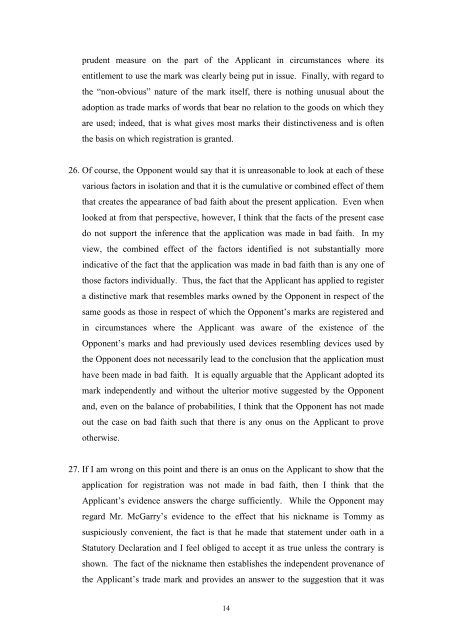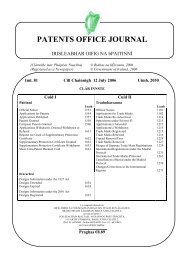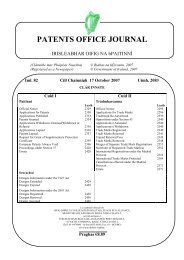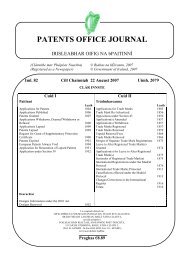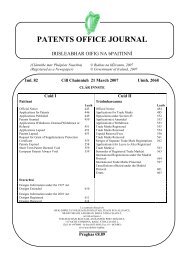TRADE MARKS ACT, 1963 - Irish Patents Office
TRADE MARKS ACT, 1963 - Irish Patents Office
TRADE MARKS ACT, 1963 - Irish Patents Office
Create successful ePaper yourself
Turn your PDF publications into a flip-book with our unique Google optimized e-Paper software.
prudent measure on the part of the Applicant in circumstances where its<br />
entitlement to use the mark was clearly being put in issue. Finally, with regard to<br />
the “non-obvious” nature of the mark itself, there is nothing unusual about the<br />
adoption as trade marks of words that bear no relation to the goods on which they<br />
are used; indeed, that is what gives most marks their distinctiveness and is often<br />
the basis on which registration is granted.<br />
26. Of course, the Opponent would say that it is unreasonable to look at each of these<br />
various factors in isolation and that it is the cumulative or combined effect of them<br />
that creates the appearance of bad faith about the present application. Even when<br />
looked at from that perspective, however, I think that the facts of the present case<br />
do not support the inference that the application was made in bad faith. In my<br />
view, the combined effect of the factors identified is not substantially more<br />
indicative of the fact that the application was made in bad faith than is any one of<br />
those factors individually. Thus, the fact that the Applicant has applied to register<br />
a distinctive mark that resembles marks owned by the Opponent in respect of the<br />
same goods as those in respect of which the Opponent’s marks are registered and<br />
in circumstances where the Applicant was aware of the existence of the<br />
Opponent’s marks and had previously used devices resembling devices used by<br />
the Opponent does not necessarily lead to the conclusion that the application must<br />
have been made in bad faith. It is equally arguable that the Applicant adopted its<br />
mark independently and without the ulterior motive suggested by the Opponent<br />
and, even on the balance of probabilities, I think that the Opponent has not made<br />
out the case on bad faith such that there is any onus on the Applicant to prove<br />
otherwise.<br />
27. If I am wrong on this point and there is an onus on the Applicant to show that the<br />
application for registration was not made in bad faith, then I think that the<br />
Applicant’s evidence answers the charge sufficiently. While the Opponent may<br />
regard Mr. McGarry’s evidence to the effect that his nickname is Tommy as<br />
suspiciously convenient, the fact is that he made that statement under oath in a<br />
Statutory Declaration and I feel obliged to accept it as true unless the contrary is<br />
shown. The fact of the nickname then establishes the independent provenance of<br />
the Applicant’s trade mark and provides an answer to the suggestion that it was<br />
14


